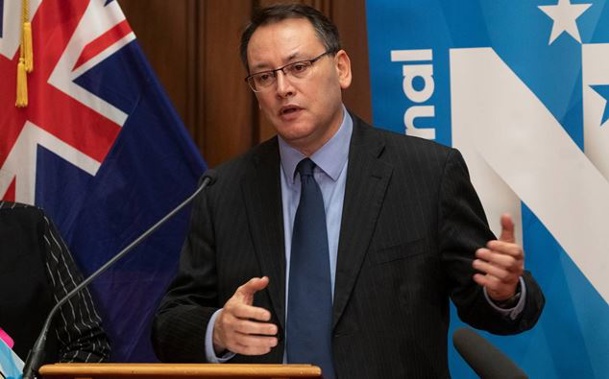
As the Labour Government retreats from the election battlefield, a potential landmine remains for the next Minister of Health: the stalled pay equity claim for care and support workers.
Health Minister Dr Ayesha Verrall tried in the final phases of her leadership to settle the claim and could not get her cabinet colleagues across the line. It was a lost last chance to dare greatly in the final weeks of her government. The 16,500 care workers covered by the claim, 93% of them women, now face further delays.
Dr Shane Reti, New Zealand’s next Health Minister, inherits this claim, but while treading carefully need not fear next steps.
For a National Government it’s Groundhog Day. His former colleagues Sir Bill English and Health Minister Jonathan Coleman led a similar settlement process with unions for care and support workers following strong union advocacy and the successful Kristine Bartlett case. Legislation was passed in 2017 to set mandated pay rates and the historic pay deal brokered by Crown negotiator Doug Martin of Martin Jenkins delivered $2 billion in wage rises to care workers.
Unfortunately, since then many gains have been lost. Wages were eroded by inflation, pay gaps widened with Te Whatu Ora employees, and the paltry increases to government contracts for the delivery of these core services do not cover the full cost of care.
The current pay claim has become a slow-moving train wreck. Perhaps Dr Reti could get the 2017 gang back together to solve the same problem?
Here’s a short summary of the latest claim. In July 2022, E tū, the Public Service Association and the Nurses Organisation raised another pay equity claim under the Equal Pay Act 2020. The employers chosen were representative of the health and disability sector. All parties to the claim are focused on achieving higher wages for the 16,500 care and support workers covered by the claim, part of the most underpaid crucial part of the health system workforce. The claim is a representative one with the goal to roll out increases across the whole 65,000-strong workforce across New Zealand.
The fifteen employers and the three unions have been united in their intention at every stage.

This unity speaks volumes and should not be undervalued. Think about it. How often do these advocacy planets align? It’s no surprise why. Anyone who considers the detailed work of care workers and current pay rates immediately understands the problem.
The pay rates which were transformational in 2017 are now woefully inadequate, particularly for those earning the minimum wage at entry level. As Dame Judy McGregor succinctly put it, these women are “ensnared in a wage poverty trap”.
The claim process as laid out in the Pay Equity Act has been followed with precision by all parties. To. The. Letter.
Te Whatu Ora, who is not a party to the claim, is the process lead funder for the nine government departments that contract for services requiring care workers. The funders are the enablers of wage increases because almost all care workers in New Zealand are paid directly or indirectly by government.
The claim process was going so well until an unexpected sinkhole appeared.
Lead funder Te Whatu Ora had signed off the progress reports setting out the results of the work to investigate the claim, but to the astonishment of the claim’s parties abruptly changed tack. Not only did the public health agency refuse to sign off the key report that is the precursor to bargaining, it sought to double back and potentially rewrite history by casting doubt on its approval of previous stages.
It’s all about the quantum of the settlement. The accurate measurement of pay undervaluation based on data and research collected while progressing the claim is considerably greater than the Ministry of Health and Te Whatu Ora budgeted estimate set at the beginning of the process.
It’s not the fault of employers, unions and care workers who participated in a robust measurement process that the Ministry of Health and Te Whatu Ora lowballed their estimate.
Te Whatu Ora has now called for a review of the valuation methodology used by the unions and employers. The late demand for a review of the process is opposed by all parties to the claim.
It’s a strange intervention because not only is Te Whatu Ora not a party to the claim, its ad hoc review deviates from the Public Service Commission policy and the legal requirements for progressing the claim. The agency has no standing or right to hold the whole process up but remains a stick-in-the-mud.
There are probably a couple of tactics at play here. Either the review is a classic public service feint to delay proceedings or it’s an attempt to gerrymander a narrower pay gap valuation to fit within their budget.
Either way Te Whatu Ora is not building much of a fan club in stalling the claim’s path to settlement.
Time is running out. The claim was supposed to be completed before the election and the clock is ticking because the Care and Support Workers legislation protecting their pay rates expires at the end of this year.
When Dr Reti is sworn in, he will have a long list of crises to deal with in the health system, but dealing with this claim must be within his top 5 for an immediate briefing and his attention.
Settling this claim is important. In aged care, society relies on these women to care for our parents, our grandparents and ultimately ourselves. The work is hard, confronting and often stressful. Despite what the pay rates indicate, it is not unskilled work, and it is work that many of us would struggle to do.
The employers and unions are ready to bargain for the benefit of these workers.
With time ticking, Dr Reti needs to prescribe a strong dose of government leadership.
Take your Radio, Podcasts and Music with you









